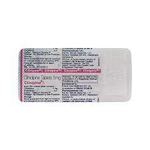blupine
Blupine 10mg Tablet is primarily used to control blood pressure. It operates through dual mechanisms: relaxing blood vessels and managing stress-related chemicals to maintain healthy blood pressure levels.
Cilnidipine blocks calcium entry into blood vessels, reducing their tightness and allowing easier blood flow, which lowers blood pressure. It also interferes with the release of norepinephrine, a stress-related chemical, that prevents blood pressure spikes during stressful situations.
Follow your doctor's instructions regarding the dose and duration. Take this medication with or without food but at a consistent time each day for better results.
Swallow the tablet whole, without chewing, crushing, or breaking it.
Be aware of the potential decrease in blood pressure. Move slowly when transitioning from sitting or lying to standing positions to avoid dizziness or fainting.
Individuals with heart conditions like heart failure or severe aortic stenosis should use cilnidipine cautiously and remain under close medical supervision.
Keep your healthcare provider informed about any other medical conditions, allergies, or medications you are taking.
Possible side effects include headache, nausea, dizziness, palpitations, edema (swelling), abdominal pain, rash, muscle pain, eye pain, tremors, and decreased blood pressure. If you experience any of these symptoms, contact your healthcare provider.
If you miss a dose, take it as soon as you remember. However, if it's almost time for your next dose, skip the missed one and continue with your regular schedule.
Do not take a double dose For guidance on managing missed doses, consult your doctor.
Similar Medicines
Available in 2 variations

Blupine 5mg Tablet
Blupine 5mg Tablet
Cilnidipine (5mg)
strip of 10 tablets

Blupine 10mg Tablet
Blupine 10mg Tablet
Cilnidipine (10mg)
strip of 10 tablets
Related Faqs

Which is better amlodipine or Cinod?
Both Cinod and amlodipine are commonly prescribed medications for treating high blood pressure and both have proven to be effective in reducing blood pressure effectively However there are some notable differences between the two medications Research has shown that Cinod may offer additional benefits for patients with kidney problems compared to amlodipine Furthermore while amlodipine may have the potential to cause mild ankle swelling Cinod has a lower chance of causing ankle swelling tachycardia and palpitations Ultimately the choice between Cinod and amlodipine will depend on your specific needs and medical history and your doctor will be able to recommend the best option for your individual circumstances

How long do I need to take Natocil?
It is crucial to adhere to your doctors prescribed duration of Natocil intake Depending on your specific circumstances you may need to take it for an extended period possibly even lifelong Regardless of feeling healthy or having wellmanaged blood pressure it is important not to discontinue Natocil without medical guidance Doing so could potentially lead to a resurgence in high blood pressure and a decline in your overall condition Thus it is vital to recognize that the cessation of Natocil may have adverse effects necessitating continuous usage for optimal health Always consult your doctor before making any changes to your medication regimen as they possess the expertise to ensure your wellbeing and help you make informed decisions regarding your treatment Remember maintaining consistent and informed adherence to your doctors recommendations is essential for managing your blood pressure and safeguarding your longterm health

Which is better amlodipine or Cilniblock?
Both Cilniblock and amlodipine are frequently prescribed medications for the treatment of hypertension and they both have similar effectiveness in reducing blood pressure However Cilniblock has demonstrated extra advantages in patients with kidney disorders compared to amlodipine Additionally while amlodipine has a higher possibility of causing mild ankle swelling Cilniblock has been observed to have a lower risk of inducing ankle swelling as well as tachycardia and palpitations Ultimately it is your doctors responsibility to decide which medication is most suitable for you taking into account your specific needs and medical conditions before making a recommendation

Which is better amlodipine or Cilblock?
Both of these medications are commonly prescribed for the treatment of high blood pressure and are equally effective in reducing blood pressure levels However Cilblock has shown additional benefits for patients with kidney problems when compared to amlodipine Ankle swelling is a potential side effect of amlodipine whereas Cilblock has been found to have a lower risk of causing swelling in the ankles as well as tachycardia and palpitations Ultimately your doctor will determine which medication is most suitable for you based on your individual needs and medical history

Is Blupine good for patients of high blood pressure with kidney impairment?
Yes, Blupine has been shown to have protective effects on the kidney cells, thereby preventing them from damage. It has also been shown to decrease protein leakage from the kidney in patients who have diabetes as well as high blood pressure.

How long do I need to take Blupine?
You should keep on taking Blupine for as long as your doctor has recommended you to take it. You may need to take it lifelong. Do not stop taking it, even if you feel well or your blood pressure is well controlled. If you stop taking Blupine, your blood pressure may increase again and your condition may worsen.
Related Posts

1:15
Are Your Hormones Out Of Balance? Signs & Symptoms!

1:15
How Do You Know If You Have a Vaginal Infection? Warning Signs!

1:15
Top Health Benefits of Cinnamon | How to Use It for Better Health!

1:15
Is Your Blood Pressure Too Low? What Are the Best Remedies to Fix Low Blood Pressure Instantly?

1:15
Mala D: How it works, When and How to take Mala D and Side Effects of Mala D!
Disclaimer : This information is not a substitute for medical advice. Consult your healthcare provider before making any changes to your treatment . Do not ignore or delay professional medical advice based on anything you have seen or read on Medwiki.
blupine
Prescription Required
Manufacturer :
BluewaterresearchComposition :
Cilnidipine (5mg)


















.svg)
